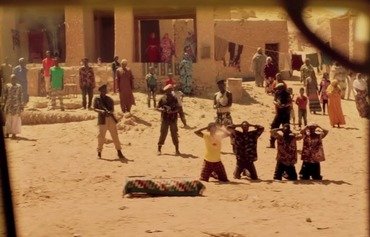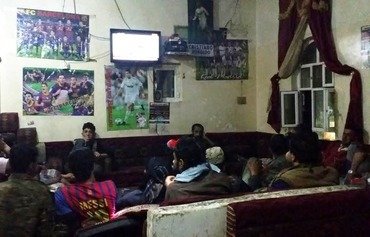Several Ramadan TV dramas this year are tackling terrorism-related topics to expose the dangers and wiles of extremist groups.
The new dramas shed light on the recruitment process of these groups and expose the distortion of religious teachings that shape their ideology.
While providing watchable entertainment, these series seek to combat the spread of terrorism, said TV critic and Cairo University lecturer Mahmoud Dallal.
"The evidence of the success of these works is the threats received by some of the participants from terrorist groups in the past," he told Al-Mashareq.
Among this year's offerings is "Gharabib Sud" (Black Crows), a series which exposes the "Islamic State of Iraq and Syria" (ISIS) group's recruitment methods, including its targeting of children and women, and reveals the human cost of terrorism.
TV drama "Selfie" returns for a third season, Dallal said, noting that it enjoyed widespread success during its first two seasons due to its comedic take on terrorism.
"Others include 'Qasr al-Ushaq' (Palace of Lovers), which deals with the issue of children falling into ISIS’s recruitment trap," he said, adding that the second season of "Hadaeq al-Shaitan" (The Gardens of Satan) exposes terrorism financing and the escape of criminals to ISIS-controlled areas.
What sets this year's Ramadan dramas apart is the "seriousness and artistic commitment with which the work is presented", he said.
TV dramas expose ISIS
Ramadan programming used to mean exclusively family-oriented dramas, said Egyptian Broadcasting Corporation programme director Dalal Hamza.
"However, the situation changed after the emergence of ISIS, and the host of [Ramadan] TV series began to include some that deal with terrorism-related issues, and ISIS in particular," she told Al-Mashareq.
Now these series have become mainstays on the list of Ramadan series and have proven to be hugely popular with viewers, she said.
Terrorism-related series that attracted the most advertising in the past have generally been those that expose the truth about these groups and their ideology, she added.
"Such series represent an opportunity for [people] to learn about the shadowy [aspects] of ISIS and similar terrorist groups," she said.
Viewer enthusiasm for this type of content is not surprising, as the shows focus on the personalities of the terrorists, the recruitment methods they use and the ideas they are trying to disseminate, she explained.
"Most of these series deal with the psychological aspect, or internal conflict between good and evil within those who fall into the recruitment trap," she said.
A foundation for discussion
Government employee and father of five Saad al-Bawab, 50, told Al-Mashareq that watching TV dramas during Ramadan is a longtime tradition he shares with his family.
"Watching these series has become a new and indispensable habit during the month of Ramadan, a time when the family gets together more than any other time during the year," he said.
"Since the rise of the spectre of extremism and its frightening spread, and particularly after the emergence of ISIS, I see these series as offering important content that my children must see," he added.
Watching shows on the recruitment methods and mind manipulation of terrorist groups in the name of religion is extremely important, al-Bawab said.
"[This] gives me a chance to hold discussions with my children to inoculate them against such ideas, using the examples embodied on the screen in front of them," he added.

![A still from the ‘Black Crows’ TV series that is airing during Ramadan. The show tackles extremism with a focus on the 'Islamic State of Iraq and Syria'. [Photo courtesy of MBC TV Channel]](/cnmi_am/images/2017/05/31/8052-isis-black-crows-600_384.jpg)







Good!
Reply1 Comment(s)